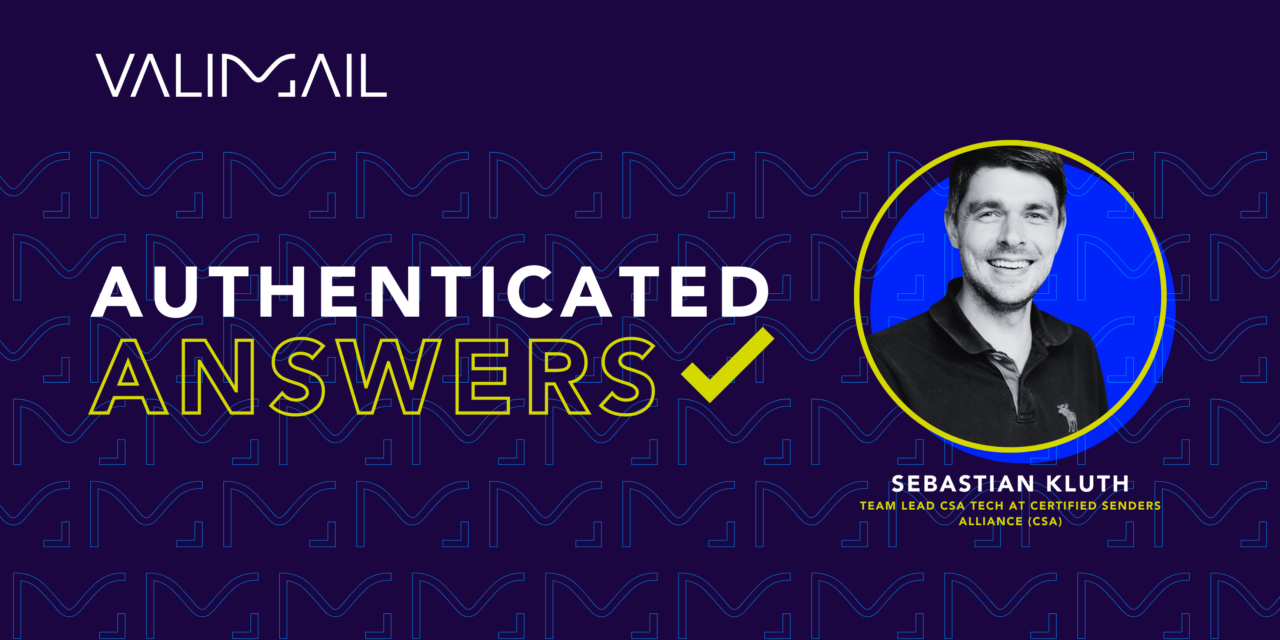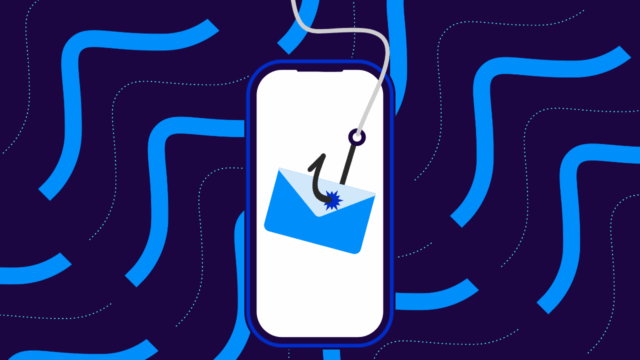Join us today with another interview in our blog series: Authenticated Answers! We sat down with Sebastian Kluth, the Team Lead CSA Tech at Certified Senders Alliance (CSA).
At Valimail, we take our work seriously but try not to take ourselves too seriously. This value inspires us to get to the heart of what makes people unique and how it affects their careers to provide valuable advice, inspiration, and insights to people working with email daily.
In this lighthearted interview series, we connect with experts from the email, IT, security, ISP, and authentication spaces to learn more about them and their experiences.
About Sebastian Kluth
Sebastion is the CSA Tech Team Lead at the Certified Senders Alliance (CSA). He oversees both operational and human aspects of the technical department, focusing on software development, administration, and data management. He represents CSA at various conferences, collaborating with mailbox providers to enhance email deliverability and certification.
Previously, he worked at Return Path, specializing in global brands’ email deliverability and migration initiatives, along with OTTO GmbH & Co. KG and Emailvision GmbH, netnomics GmbH, and Gruner + Jahr.
In addition to his dedication to email, he is an old-timer tractor fan passionate about firewood and chainsaws. He enjoys the camper van life and driving his motorbike.
How do you stay motivated when learning something challenging or frustrating?
I break it down into small pieces and take it one step at a time. Throughout my life, I’ve used the “teamwork makes the dream work” principle – I usually ask for help, support, and, most importantly, intermediate feedback.
What was the last wall you crashed through?
I’m not a mechanic, but with the help of YouTube videos and a Facebook group, I restored my old-timer tractor and had it approved by the German TÜV to be used on public roads for the first time in 20 years. Imagine an email geek with a tablet and oil-smeared hands repairing a 60-year-old tractor, swearing at a large piece of iron at irregular intervals.
What’s your favorite way to show gratitude?
It depends, but most people are often happy to receive a simple and sincere THANK YOU. I never forget the people who have helped me. And being a true North German, saying thank you explicitly and formally is already an act of exuberance. Normally, a smiling, affirmative nod and a brief, direct glance is an expression of deep gratitude.
What’s the funniest mistake you’ve made, and how’d you handle it?
I can’t remember a funny mistake. I’ve certainly made mistakes and will continue to do so; I’m only human. I’ve never had a problem admitting mistakes and accepting feedback. If anyone can remember a funny mistake I’ve made, I’d love to hear about it and share a laugh.
What’s the smallest hill you are willing to die on?
Email marketing requires a dedicated subdomain from the brand. This dedicated subdomain of choice has to be set for 5322.domain, 5321.domain, and DKIM in strict alignment. DMARC has to be set on p=reject.
A marketing email with no-reply@ in the reply-to header is spam.
A bag of crisps must be eaten after the first opening. No bag of crisps is resealable, so it must be eaten completely.
What tips would you give to a new email marketer?
In email marketing, trial and error doesn’t work for long. Best practices are not just for entertainment; they are made for use. Be creative but not experimental or criminal.
Don’t build your knowledge at trade shows. Look for dedicated training on specific topics such as deliverability, data management, email marketing tools, and reporting and analytics. It is easy to damage email marketing but hard to rebuild it.
How would you explain DMARC to your grandparents, friends, or relatives?
I won’t. They don’t even understand my passion for email marketing or email in general or what it’s all about! And why should I explain something to them that they will never use? Sometimes, it is easier not to know everything but to know someone who does and who you can trust when you need to use it.
What do you expect from the future of email?
We have entered an evolutionary phase in the email ecosystem where I believe we need to demand and implement a differentiated approach to adapting and implementing best practices. The freedom and independence of email is our most valuable asset and must be protected. But the spammers (and I’m not just talking about the really illegal stuff) have demanded a lot of us over the last 20 years in terms of standards development, shamelessly exploiting the leniency in protecting email freedom. Spammers are always the first to implement new technical standards. In my opinion, the fundamentally liberal approach must, therefore, be adapted to the respective use cases.
An email service provider can be much more rigorous in implementing best practices to quickly address major security vulnerabilities in bulk email. However, this liberal approach leads to a mismatch between what is maximally possible and what is minimally implemented. The result is that mailbox providers are too afraid of collateral damage if they demand standards more rigorously, but email service providers and advertisers are looking for the path with the least effort out of pure commercial interest.
However, the collaboration between Google and Yahoo has shown that this is the only way to make a real difference. Therefore, there is a need for more solidarity among all the MBPs to give the ESPs a clear direction and justification in the tough battle to convince the brands to implement the necessary changes.
Mailing lists or sending emails between mailbox providers (the whole issue of forwarding) should be considered separately to move from endless discussions to concrete solutions.
I believe that, for all the liberality worth protecting, there is no “one fits all,” but rather a “few fits all.”
Email is 50 years old and not the email it used to be. Its enormous success, particularly in commercial use, is a powerful illustration of this change – most email is commercial. The commercial use of email should, therefore, include the requirement that the revenue be reinvested in the technical implementation of standards and not just in achieving good marketing results.
In my view, the return on investment is in the continued viability of the email ecosystem and the certainty that we will all be able to make a living from email for the next 50 years.
Read more interviews
If you’d like to share your thoughts with us or nominate a leader in the email space to be featured, don’t hesitate to reach out to content-marketing@valimail.com!
Liked this interview? Check out our previous guests!
Sr. Content Marketing Manager at Valimail
Alyssa Harmon



